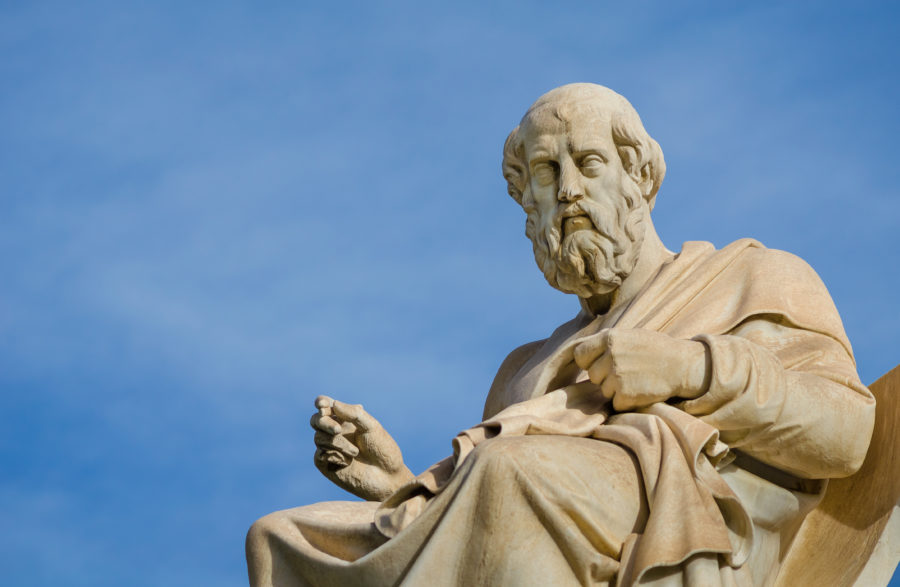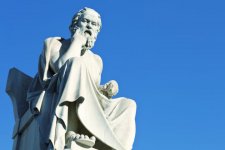Menu
Install the app
How to install the app on iOS
Follow along with the video below to see how to install our site as a web app on your home screen.
Note: This feature may not be available in some browsers.
You are using an out of date browser. It may not display this or other websites correctly.
You should upgrade or use an alternative browser.
You should upgrade or use an alternative browser.
Greek History Community
Who are your favorite Greek philosophers?
- Thread starter cf_fraiser
- Start date
1 - 7 of 7 Posts
Vangelis
Active member
I remember doing this at school and thinking what is this rubbish they are teaching us? Now, I find myself quoting it all the time!Aristotle for sure. I love the allegory of the cave
francescool
Active member
Same!! The more we learn the more were able to learnI remember doing this at school and thinking what is this rubbish they are teaching us? Now, I find myself quoting it all the time!
k_tsoukalas
Administrator
I think it is a good idea to start with an overview. There are many philosophers, and all came about at different time periods and have different, conflicting beliefs. Maybe start here?

 www.greekboston.com
www.greekboston.com

Top Ancient Greek Philosophers
Here's a look at the top ten ancient Greek philosophers.
1 - 7 of 7 Posts
JOIN THE DISCUSSION AND READ OTHER GREEK INFO:
Interesting Greek History Topics I Like
- redsoxdw_
- Greek History Forum
- Replies: 2
The Persian Wars: The wars fought between Greece and the Persian empire in the 5th century BC were some of the most consequential conflicts of ancient times. Learn about the key events, such as the Battle of Marathon and the Battle of Thermopylae, and the strategies that allowed the Greeks to repel the Persian invaders.
The Rise of Athens: Arguably the most influential city-state in ancient Greece, Athens was the birthplace of democracy, philosophy, and the arts. Follow the rise of Athens from a humble village to a powerhouse of trade and culture.
The Peloponnesian War: The decades-long conflict between Athens and Sparta was a turning point in Greek history, leading to the decline of Athens and the rise of Macedon under Philip II and his son Alexander.
The Life of Alexander the Great: The young conqueror who led his armies across the known world, Alexander the Great is one of the most famous and admired figures of ancient history. Learn about his upbringing, his conquests, and his legacy.
The Olympic Games: A tradition that continues to this day, the ancient Olympics were a celebration of sports, culture, and political power. Explore the origins of the games and the events that took place.
The Rise of Athens: Arguably the most influential city-state in ancient Greece, Athens was the birthplace of democracy, philosophy, and the arts. Follow the rise of Athens from a humble village to a powerhouse of trade and culture.
The Peloponnesian War: The decades-long conflict between Athens and Sparta was a turning point in Greek history, leading to the decline of Athens and the rise of Macedon under Philip II and his son Alexander.
The Life of Alexander the Great: The young conqueror who led his armies across the known world, Alexander the Great is one of the most famous and admired figures of ancient history. Learn about his upbringing, his conquests, and his legacy.
The Olympic Games: A tradition that continues to this day, the ancient Olympics were a celebration of sports, culture, and political power. Explore the origins of the games and the events that took place.
Question about Greece during WWI
- ssherie_
- Greek History Forum
- Replies: 2
I am trying to learn more about Greek history. This is a family project! What I am learning about now is Greece's involvement in WWI. From what I've gathered, Greece had a rather complex and interesting stance during World War I, but I'm looking for more in-depth information.
Could anyone here provide insights or point me towards resources that detail:
Could anyone here provide insights or point me towards resources that detail:
- Greece's political climate leading up to its involvement in WWI.
- The significance of the National Schism and how it affected Greece's participation.
- Key battles or military campaigns that Greek forces were involved in.
My Top Favorite Greek Philosophers
- paharo45
- Greek History Forum
- Replies: 1
There are too many philosophers to count, but these are the ones I am studying at the moment. It's fascinating to me how influential the Greek philosophers are. Here's some things I am learning:
#1 Socrates
If philosophy had a poster boy, Socrates might very well be it. The father of Western philosophy, Socrates was a gadfly to Athenian society, questioning everything and Master to Plato. Known for the Socratic Method and his unflinching commitment to truth, Socrates' influence is immeasurable despite never having written a word.
#2 Plato
Rightly succeeding his mentor on this list, Plato's Academy saw him birth the first "university" of its kind. His unabashed idealism, immortal Forms, allegories like the Cave, and the pursuit of 'The Good' in moral philosophy set the stage for much intellectual discourse.
#3 Aristotle
Aristotle, another of Plato's students, had a more grounded approach to philosophy than his predecessor. With establishing principles of logic and reason, and contributions to virtually every field of academia, from poetry to physics, Aristotle's body of work remains foundational.
#4 Heraclitus
Heraclitus, famed for the idea that "change is the only constant," viewed the cosmos through a lens of process, flux, and an everlasting Logos that governs the world. Although little of his work survives, his influence on ancient and modern thinkers is profound.
#5 Epicurus
Known for his eponymous philosophy, Epicurus taught that the greatest good is to seek modest pleasures in order to attain a state of tranquility, freedom from fear (ataraxia), and absence of bodily pain (aponia). Often misunderstood, Epicureanism is starkly different from the modern use of 'epicurean' - it's much less about a luxury lifestyle and more about ethical considerations regarding personal fulfillment.
#1 Socrates
If philosophy had a poster boy, Socrates might very well be it. The father of Western philosophy, Socrates was a gadfly to Athenian society, questioning everything and Master to Plato. Known for the Socratic Method and his unflinching commitment to truth, Socrates' influence is immeasurable despite never having written a word.
#2 Plato
Rightly succeeding his mentor on this list, Plato's Academy saw him birth the first "university" of its kind. His unabashed idealism, immortal Forms, allegories like the Cave, and the pursuit of 'The Good' in moral philosophy set the stage for much intellectual discourse.
#3 Aristotle
Aristotle, another of Plato's students, had a more grounded approach to philosophy than his predecessor. With establishing principles of logic and reason, and contributions to virtually every field of academia, from poetry to physics, Aristotle's body of work remains foundational.
#4 Heraclitus
Heraclitus, famed for the idea that "change is the only constant," viewed the cosmos through a lens of process, flux, and an everlasting Logos that governs the world. Although little of his work survives, his influence on ancient and modern thinkers is profound.
#5 Epicurus
Known for his eponymous philosophy, Epicurus taught that the greatest good is to seek modest pleasures in order to attain a state of tranquility, freedom from fear (ataraxia), and absence of bodily pain (aponia). Often misunderstood, Epicureanism is starkly different from the modern use of 'epicurean' - it's much less about a luxury lifestyle and more about ethical considerations regarding personal fulfillment.
What did the Ancient Greeks eat?
- mj_toronto8
- Greek History Forum
- Replies: 1
I am fascinated by the Ancient Greeks. I have a feeling that some of our modern Greek recipes are similar to the ancient ones. Like spoon sweets. It think that seems like something that was developed a long time ago as a way to preserve the fruit harvest.
So, I have been researching this. What did the Ancient Greeks eat? I wanted to share this video because I thought it was interesting.
So, I have been researching this. What did the Ancient Greeks eat? I wanted to share this video because I thought it was interesting.
How did the Marshall Plan affect Greece?
- redsoxdw_
- Greek History Forum
- Replies: 0
I've recently taken an interest in the post-WWII recovery efforts and came across the Marshall Plan, which was introduced by the United States to aid European countries in rebuilding their economies. Given that Greece was significantly affected during the war, I'm curious about the specific impact the Marshall Plan had on Greece.
From what I've gathered, Greece, like many other European countries, faced tremendous economic challenges post-WWII, including infrastructure damage, inflation, and high unemployment rates. The Marshall Plan, formally known as the European Recovery Program, promised substantial financial aid to help rebuild war-torn nations, but I'm curious about how this plan was implemented in Greece specifically and what long-term effects it had on its economy and society.
I am so curious as to how, specifically, this plan affected Greece?
From what I've gathered, Greece, like many other European countries, faced tremendous economic challenges post-WWII, including infrastructure damage, inflation, and high unemployment rates. The Marshall Plan, formally known as the European Recovery Program, promised substantial financial aid to help rebuild war-torn nations, but I'm curious about how this plan was implemented in Greece specifically and what long-term effects it had on its economy and society.
I am so curious as to how, specifically, this plan affected Greece?
Share and discuss Greek history!
WorldwideGreeks.com is a free online forum community where people can discuss Greek food, travel, traditions, history and mythology.
Join Worldwide Greeks here!
Join Worldwide Greeks here!
JOIN COMMUNITY FOR FREE
LOGIN TO YOUR ACCOUNT



